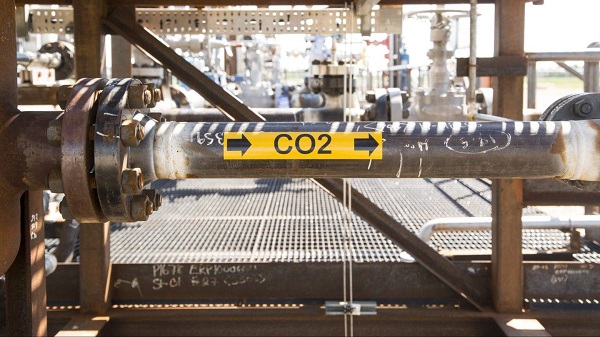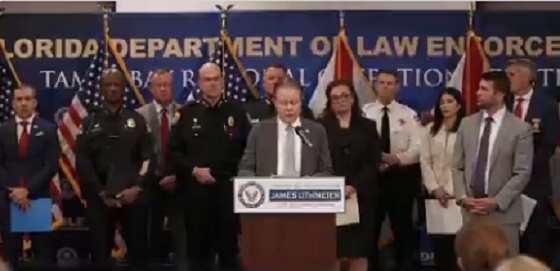Alberta
Clean energy think tank says Alberta has the resources to lead Canada in carbon capture and storage

From the Canadian Energy Centre
By Cody Ciona
In August, two new CCS projects in the province got the green light to proceed
Alberta has strategic advantages in carbon capture and storage (CCS), a core technology to achieve carbon neutrality, says a director with the low-carbon energy think tank Clean Prosperity.
“I think it’s important for us to remember that we have the people, we have the geography and we have that great policy environment to be able to lead on CCS across the country,” Adam Sweet said during a recent webinar.
According to the International Energy Agency, 45 commercial CCS facilities are in operation worldwide.
Alberta has five operational CCS projects, which have stored roughly 14 million tonnes of CO2, and dozens more projects are in various development stages.
The province is situated atop the Western Canada Sedimentary Basin, which boasts an abundance of potential storage space for captured carbon.
According to a study by Clean Prosperity, Alberta has around 79,000 megatonnes of pore space available in underground saline aquifers and mature or depleted oil and gas wells.
“One of the main reasons why CCS is so big in Alberta is, frankly, we have the geology,” said Sweet.
In August, two new CCS projects in Alberta got the green light to proceed.
Shell and partner ATCO EnPower announced they will build a new CCS project at the Scotford refinery and chemicals complex near Edmonton, while on a smaller scale, Entropy Inc. will add a second phase of CCS at its Glacier gas plant near Grande Prairie.
Combined, the projects are expected to capture and store about 810,000 tonnes of CO2 per year, the equivalent of taking nearly 200,000 cars off the road annually. Entropy’s project is to start in 2026 and Shell/ATCO’s in 2028.
Sweet said that in addition to Alberta’s geological ability to store vast quantities of CO2 underground, the province has advantages including the Technology Innovation and Emissions Reduction (TIER) regulation, an industrial carbon price that has existed for nearly 20 years.
This regulation covers around 60 per cent of Alberta’s total emissions and around half of Canada’s total industrial emissions, according to Clean Prosperity. The ability to generate carbon credits makes TIER attractive for companies considering CCS.
“Those facilities that invest in carbon capture and storage and can reduce or can create these carbon credits by coming underneath the benchmark, they can then sell those carbon credits,” said Sweet.
He said that in addition to the TIER regulation, Alberta’s expertise and knowledge of energy production are another key asset that makes it an attractive jurisdiction for CCS.
“We often forget that we have knowledge and experience of working underground, as well as working with everything from the valves to the pipes and all the different pieces that exist in this low carbon energy economy.”
Government support is helping drive new CCS development.
Alberta is finalizing its carbon capture incentive program, which covers up to 12 per cent of eligible capital costs, while the federal government has implemented its CCS investment tax credit, which covers up to 60 per cent of capture equipment and 37.5 per cent of the cost for transportation, storage or usage equipment.
Both governments have supported CCS projects in the past: Shell’s $1.3 billion Quest project received $745 million from Alberta’s government and $120 million from Ottawa, while the $1.2 billion Alberta Carbon Trunk Line received $495 million from Alberta and $63.2 million from the federal government.
Alberta
So Alberta, what’s next?

Albertans, not Ottawa, should shape Alberta’s future. The Alberta Next Panel is hitting the road to engage directly with Albertans and chart a path forward for the province.
Albertans are frustrated after 10 years of punitive policies, enacted by the federal government, attacking Alberta’s economy and targeting its core industries.
Chaired by Premier Danielle Smith, the Alberta Next panel will bring together a broad mix of leaders, experts, and community voices to gather input, discuss solutions, and provide feedback to government on how Alberta can better protect its interests, defend its economy, and assert its place in Confederation.
The panel will consult across the province over the summer and early fall to ensure that those living, working, doing business and raising families are the ones to drive Alberta’s future forward. The work will include identifying solutions advanced by Albertans on how to make Alberta stronger and more sovereign within a united Canada that respects and empowers the province to achieve its full potential. It will also include making recommendations to the government on potential referendum questions for Albertans to vote on in 2026.
It will consider and hear from Albertans on the risks and benefits of ideas like a establishing an Alberta Pension Plan, using an Alberta Provincial Police Service rather than the RCMP for community policing, whether Albertans should consider pursuing constitutional changes, which (if any) changes to federal transfer payments and equalization Albertans should demand of the federal government, potential immigration reform that would give the provincial government more oversight into who comes to the province, and changes to how Alberta collects personal income tax. Albertans will also have the opportunity to put forward their own ideas for discussion.
“This isn’t just about talk. It’s about action. The Alberta Next Panel is giving everyday Albertans a direct say in the direction of our province. It’s time to stand up to Ottawa’s overreach and make sure decisions about Alberta’s future are made here, by the people who live and work here.”
“Right now, there is a need to restore fairness and functionality in the country. Years of problematic policy and decisions from Ottawa have hurt Albertan and Canadian prosperity. I am honoured to be asked by Premier Smith to participate in the Alberta Next Panel. This panel is about listening to Albertans on how we build a stronger Alberta within a united Canada, to which I, and the Business Council of Alberta, are firmly committed.”
Chaired by Premier Danielle Smith, the panel includes 13 additional members, including elected officials, academics, business leaders and community advocates:
- Honourable Rebecca Schulz, Minister of Environment and Protected Areas of Alberta
- Brandon Lunty, MLA for Leduc-Beaumont
- Glenn van Dijken, MLA for Athabasca-Barrhead-Westlock
- Tara Sawyer, MLA-elect for Olds-Didsbury-Three Hills
- Bruce McDonald, former justice, Court of Appeal of Alberta
- Trevor Tombe, director of fiscal and economic policy, the University of Calgary School of Public Policy
- Adam Legge, president, Business Council of Alberta
- Andrew Judson, vice chairman (prairies), Fraser Institute
- Sumita Anand, vice president, Above and Beyond Care Services
- Melody Garner-Skiba, business and agricultural advocate
- Grant Fagerheim, president and CEO, Whitecap Resources Inc.
- Dr. Akin Osakuade, physician and section chief, Didsbury Hospital
- Dr. Benny Xu, community health expert
- Michael Binnion, president, Questerre Energy
Albertans have a choice: let Ottawa continue calling the shots—or come together to chart our own course. What’s next? You decide.
Key facts:
- Town hall dates and sites, along with other opportunities to participate in this engagement, are available online at Alberta.ca/Next. Exact locations will be posted in the weeks ahead of the event, and Albertans will be asked to RSVP online.
- The panel’s recommendations will be submitted to government by Dec. 31, 2025.
- It is anticipated that the panel will add additional members in the coming weeks.
Related information
Related news
 ]
]


Alberta
Alberta poll shows strong resistance to pornographic material in school libraries

From LifeSiteNews
A government survey revealed strong public support, particularly among parents, for restricting or banning sexually explicit books.
Albertans are largely opposed to their children viewing pornography in school libraries, according to government polling.
In a June 20 press release, the Government of Alberta announced that their public engagement survey, launched after the discovery of sexually explicit books in school libraries, found that Albertans strongly support removing or limiting such content.
“Parents, educators and Albertans in general want action to ensure children don’t have access to age-inappropriate materials in school libraries,” Demetrios Nicolaides, Minister of Education and Childcare, said.
“We will use this valuable input to guide the creation of a province-wide standard to ensure the policy reflects the priorities and values of Albertans,” he continued.
READ: Support for traditional family values surges in Alberta
The survey, conducted between May 28 to June 6, received nearly 80,000 responses, revealing a widespread interest in the issue.
While 61 percent of respondents said that they had never previously been concerned about children viewing sexually explicit content in libraries, most were opposed to young children viewing it. 34 percent said children should never be able to access sexually explicit content in school libraries, while 23 percent believed it should be restricted to those aged 15 and up.
Similarly, 44 percent of parents of school-aged children were supportive of government regulations to control content in school libraries. Additionally, 62 percent of respondents either agreed or strongly agreed that “parents and guardians should play a role in reporting or challenging the availability of materials with sexually explicit content in school libraries.”
READ: Alberta Conservatives seeking to ban sexually graphic books from school libraries
The polling results come after the Conservative Alberta government under Premier Danielle Smith announced that they are going ahead with plans to eventually ban books with sexually explicit as well as pornographic material, many of which contain LGBT and even pedophilic content, from all school libraries, on May 27.
At the time, Nicolaides revealed that it was “extremely concerning” to discover that sexually explicit books were available in school libraries.
The books in question, found at multiple school locations, are Gender Queer, a graphic novel by Maia Kobabe; Flamer, a graphic novel by Mike Curato; Blankets, a graphic novel by Craig Thompson; and Fun Home, a graphic novel by Alison Bechdel.
-

 Bruce Dowbiggin1 day ago
Bruce Dowbiggin1 day agoWhat Connor Should Say To Oilers: It’s Not You. It’s Me.
-

 Business1 day ago
Business1 day agoThe Passage of Bill C-5 Leaves the Conventional Energy Sector With as Many Questions as Answers
-

 Business2 days ago
Business2 days agoFederal fiscal anchor gives appearance of prudence, fails to back it up
-

 Business1 day ago
Business1 day agoCanada should already be an economic superpower. Why is Canada not doing better?
-

 Alberta1 day ago
Alberta1 day agoAlberta poll shows strong resistance to pornographic material in school libraries
-

 Crime1 day ago
Crime1 day agoFlorida rescues 60 missing kids in nation’s largest-ever operation
-

 Banks1 day ago
Banks1 day agoScrapping net-zero commitments step in right direction for Canadian Pension Plan
-

 Business12 hours ago
Business12 hours agoWhile China Hacks Canada, B.C. Sends Them a Billion-Dollar Ship Building Contract


